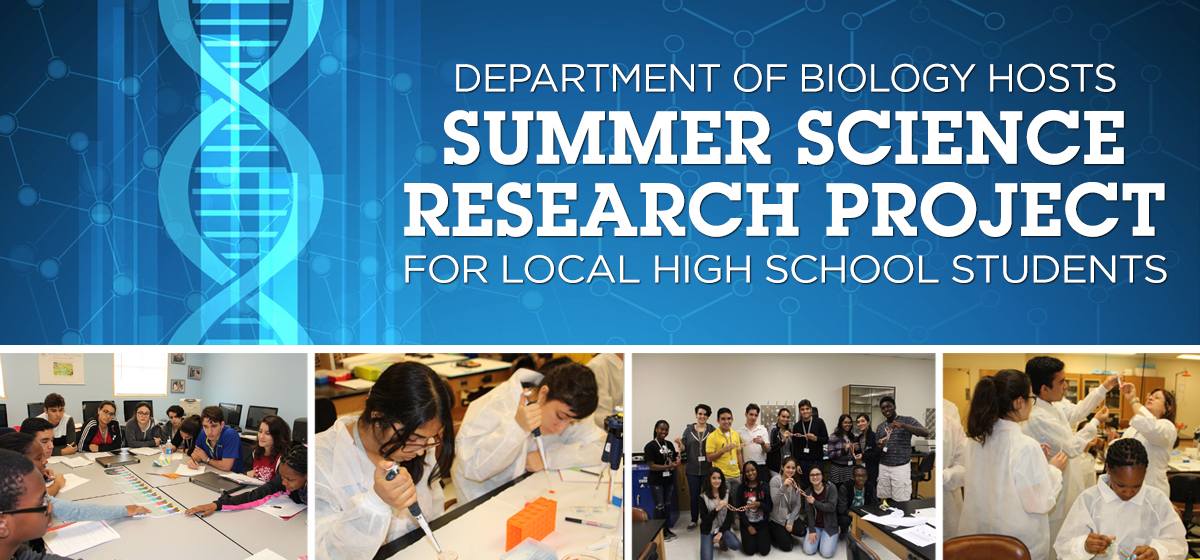Since 1995, Barry University’s Department of Biology has helped shape the minds of students – and possibly future scientists – through its Summer Science Research Program (SSRP), a comprehensive, four-week research program that immerses high school sophomores, juniors and seniors in life science research while exposing them to the college environment.
It’s just enough time to make a lasting impact on minds that are still developing, thinking about the future and realizing how they might change the world through science.
Fourteen students took part in this year’s program, which took place June 18 – July 8. The schools that were represented include: Miami Norland Senior High School; G. Holmes Braddock Senior High School; Mater Academy Lakes High School; Doctors Charter School; Miami Lakes Educational Center; Miami Beach Senior High School; American Senior High School; Archimedean Upper Conservatory; Saint Brendan High School; Monsignor Edward Pace High School; and Pompano Beach High School
Led by Dr. Flona Redway and Dr. Teresa Petrino-Lin, who serve as co-directors, the program is offered at no cost to students in Miami-Dade and Broward counties. It presents a unique opportunity for these students – who come from economically disadvantaged homes – to experience college through lectures, workshops and debates. It also opens their minds to science by introducing them to an authentic inquiry-based science project; state-of-the-art molecular biology methodology; science communication; and a formal research presentation on the last day.
This year’s project focused on genetically modified foods. For their research, students were immersed into the project by isolating DNA from foods made from corn, soy bean or wheat. They then amplified parts of this DNA by performing a method called polymerase chain reaction (PCR); finally, they analyzed the results looking for the presence or absence of the specific DNA sequences characteristic of those artificially introduced genes.
“My favorite part of the program is gaining college experience alongside scientists. It opened my eyes to just how many different branches are available in the science department,” said Diana Rodriguez, a sophomore at Miami Lakes Educational Center. “This program gave me a lot to think about. Not only did we research whether our designated food product was previously genetically modified, but we also attended numerous insightful college readiness workshops.”
The readiness that Rodriguez speaks of only scratches the surface of the many meaningful attributes of the program. The hope is that students will go away feeling enlightened and empowered about the college experience.
“As educators, our goal is to provide opportunities to strengthen the science skills and college readiness of youth who may not otherwise view college as a viable option,” says Petrino-Lin. “In the SSRP, high school students are immersed in and experience the excitement of scientific discovery in a supportive, nurturing setting.”
The experience involves the introduction to new science-based technology, to which some students may not have access. All of this is made possible through community funding, which is provided by The Children’s Trust, Miami-Dade County Department of Cultural Affairs and the Cultural Affairs Council, Miami-Dade County and Publix Super Markets Charities.
The influence of the SSRP cannot be overstated. As they say, the numbers speak for themselves.
“The impact of the program is tremendous. To date, 99 percent of those who have updated us on their progress have enrolled in undergraduate degree programs, including right here at Barry,” says Redway. “In fact, one summer 2015 participant will enroll in our Biology program in fall 2016. In addition, 87 percent have graduated (BS/BA) and 42 percent have pursued advanced studies, earning professional degrees in a wide variety of fields."
Another great thing about the program is that it prevents students from having an unproductive summer, one in which it is common to be less engaged in academics or other mind-stimulating activities. Instead, by taking part in the SSRP, students get the opportunity to expand their minds in ways they never have before, and it can even prompt them to think about their future.
“If I was not in this program, I would most likely be at home watching movies and reading. My favorite part about the program is that I was able to work in the lab and learn lots of things that I didn’t know before,” said Katelynn Garcia, a junior at Mater Lakes Academy. “This program has prepared me in various different ways, but the most helpful has been the guidance when it comes to choosing a career.”
That statement is echoed by Daniel Quintas, a junior at Miami Beach Senior High School. He says that he loved the hands-on experience in the labs, and he’s convinced he’ll “be more prepared thanks to the program.”

